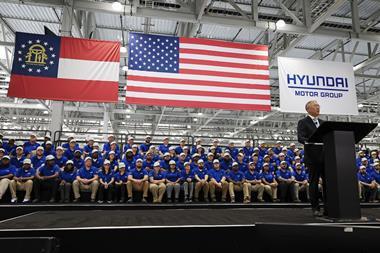
Jaguar Land Rover is moving to the next stage of its inbound logistics realignment with DHL Supply Chain and the much-needed cost savings of the collaboration look likely to benefit the UK automotive industry more widely.
Since April, when it took over the full inbound contract for JLR and implemented its lead logistics provider service model, DHL has been streamlining the new process across the carmaker’s Halewood, Castle Bromwich and Solihull plants, taking advantage of calendar shutdowns at the plants to avoid any disruption to the production schedule. Affording JLR a single point of supply chain management, the company has applied a range of new routing and scheduling tools and introduced a shared container management concept that has brought greater visibility and immediate cost savings of 12%.
This radical overhaul now promises to bring similar benefits to those carmakers sharing a common supply base with Jaguar Land Rover.
Laurie Cogger, DHL Supply Chain’s vice president of LLP Automotive said that the cross dock it now operates in conjunction with JLR at Solihull promises benefits for other OEMs as well.
“We have a number of other similar accounts that we run through here, Ford and BMW are the two main ones, and we’re also moving product on behalf of Visteon and IAC, which are both Jaguar Land Rover suppliers,” he said.
“Now, if you look at Ford, probably about 50% of the supplier base is common, or certainly within the same postcode, so what we aim to do is utilise the incoming fleet. Rather than go and pick up a palette for Ford and two for JLR, we go in the same vehicle. That collaboration came over just before the summer shutdown and we’re working on the next stage of that linkage.”
The operational success of the new model is welcome during a challenging time for JLR as it responds to the downturn with an overhaul of its business. Last week’s news that the company had secured £500m in funding from a number of banks came on the heels of an announcement that it was planning to shut either its Solihull or Castle Bromwich facility as part of a ‘gateway process’ which remains very much under wraps. At the same time the company is planning to double production to 300,000 vehicles despite the cut in production facilities and add the new LRX model at Halewood.
Better logistics is a priority part of steering through the changes affecting the company and a central part of the companies attempts to drive growth, increase profitability and meet the challenges of climate change.
“For me logistics is the hub of any organisation,” said David Dyke, director of material, planning and logistics at JLR. “Over the last 18 months we’ve undergone some significant changes. We’ve resourced our UK, European and plant business because of the value proposition we got from our new partner. This was significant given what turned out to be a serious period of change in the industry and it was the right thing to do because it gave us a more agile, one-point solution that got us through the last nine months very effectively.”
Furthermore, he believes that the new organisation for inbound is a good example of the way business will be conducted for the future.
“The economic climate over the last 9-12 months has led us to break down barriers that we might not have normally considered,” said Dyke. “And it has definitely been the right thing for the people we’ve elected to work with. We haven’t had any kickbacks. If you really are open in a partnership about the joint opportunities you can deliver some outstanding results.”

























![Global[1]](https://d3n5uof8vony13.cloudfront.net/Pictures/web/a/d/s/global1_726550.svgz)










